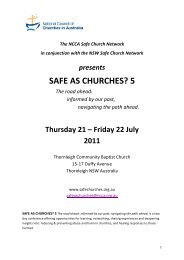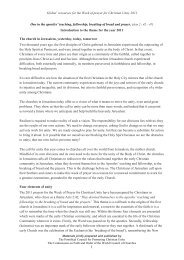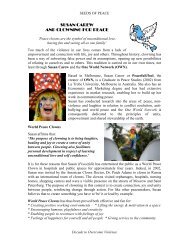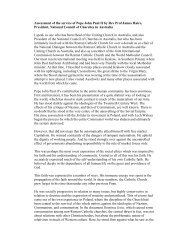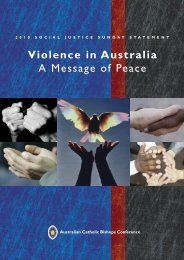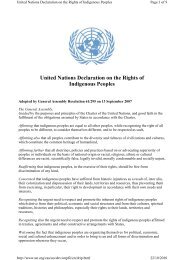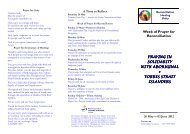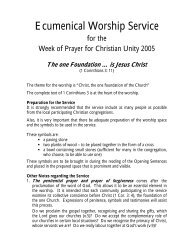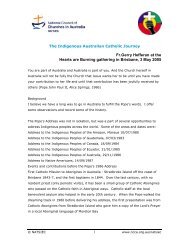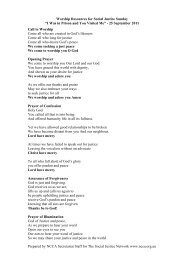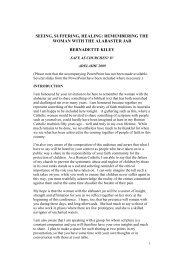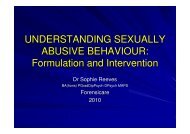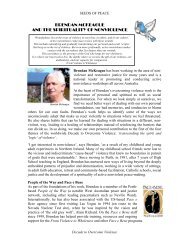Commonwealth for the Common Good Address Graeme Mundine ...
Commonwealth for the Common Good Address Graeme Mundine ...
Commonwealth for the Common Good Address Graeme Mundine ...
Create successful ePaper yourself
Turn your PDF publications into a flip-book with our unique Google optimized e-Paper software.
<strong><strong>Common</strong>wealth</strong> <strong>for</strong> <strong>the</strong> <strong>Common</strong> <strong>Good</strong> <strong>Address</strong><br />
<strong>Graeme</strong> <strong>Mundine</strong><br />
October 17 th 2006<br />
From Boiled Lollies to Shared Responsibility Agreements: What<br />
hope <strong>for</strong> <strong>the</strong> future<br />
I begin by paying my respect to <strong>the</strong> local Indigenous Peoples of this area, a group my<br />
people, <strong>the</strong> Bundjalung People, would have traded with and mixed with spiritually<br />
and socially over many thousands of years.<br />
I stand be<strong>for</strong>e you as an economic refugee who had to move out of my own home<br />
country in search of better opportunities, in education and employment, despite this<br />
moving away, one thing I always recall is my fellow people, of my own country, who<br />
have not had <strong>the</strong> same opportunities as me. Those people who are still at home and<br />
who suffer great hardships because <strong>the</strong>y are not allowed to participate fully in <strong>the</strong> life<br />
of this great nation. I also recall what I had to give up to move into this new world. It<br />
is important to always remind myself of who I am and where I come from. Yes, I am<br />
different from <strong>the</strong> newcomers and yes, I am proud of it.<br />
In 2000, <strong>the</strong> world’s leaders came toge<strong>the</strong>r and made a commitment to alleviate world<br />
poverty by 2015, <strong>the</strong>y called this <strong>the</strong> Millennium Declaration from which <strong>the</strong> eight<br />
Millennium Development Goals were developed.<br />
In supporting <strong>the</strong>se time bound and measurable goals our leaders were making a bold<br />
statement; <strong>the</strong>y believed and, more importantly, <strong>the</strong>y had <strong>the</strong> will to alleviate poverty<br />
in <strong>the</strong> world by 2015. Subsequently, <strong>the</strong> International community supported this call<br />
and made a commitment to holding our leaders accountable through <strong>the</strong> Make Poverty<br />
History campaign which millions of us have supported around <strong>the</strong> world.<br />
The MDGs are focused on relieving poverty amongst <strong>the</strong> poorest of <strong>the</strong> poor. So,<br />
when I heard of <strong>the</strong>m I thought, great, at last we may have some action on poverty <strong>for</strong><br />
our Indigenous peoples here. But <strong>the</strong> more I learnt <strong>the</strong> more I realised that <strong>the</strong>re was<br />
<strong>Graeme</strong> <strong>Mundine</strong> “<strong>Common</strong> Wealth <strong>for</strong> <strong>the</strong> <strong>Common</strong> <strong>Good</strong> <strong>Address</strong> 2006” 1
no mention of Indigenous Peoples. Now, I know that Indigenous peoples were not<br />
part of <strong>the</strong> development process of <strong>the</strong> MDGs, <strong>the</strong>re was little, if any consultation and<br />
<strong>the</strong>re was, and still are, no specific strategies to address Indigenous poverty. This is<br />
despite <strong>the</strong> fact that world wide Indigenous Peoples are <strong>the</strong> poorest of <strong>the</strong> Poor. In<br />
addition, <strong>the</strong> MDGs do not address <strong>the</strong> issue of poverty within so called “developed”<br />
countries. In fact, a key criticism of <strong>the</strong> progress so far has been that Governments<br />
have tended to treat <strong>the</strong> MDGs as a <strong>for</strong>eign policy and overseas aid issue, ra<strong>the</strong>r than<br />
adapting <strong>the</strong>m to deal with poverty at home.<br />
So, we decided that it was no good criticising from <strong>the</strong> side lines, ra<strong>the</strong>r that we<br />
needed to do <strong>the</strong> adapting ourselves so that we could apply <strong>the</strong> MDGs at home and so<br />
<strong>the</strong> Make Indigenous Poverty History campaign was born.<br />
In doing this we are not negating or diminishing <strong>the</strong> necessity of alleviating poverty<br />
<strong>for</strong> <strong>the</strong> poor overseas, <strong>the</strong>re is no reason, o<strong>the</strong>r than an inequitable allocation of<br />
resources and wealth worldwide, why <strong>the</strong>se people continue to live on <strong>the</strong> edge of<br />
existence.<br />
Likewise, <strong>the</strong>re is no reason why Aboriginal and Torres Strait Islander peoples should<br />
continue to experience such extreme disadvantage here in a wealthy country such as<br />
Australia. We should not be complacent and say that because of our social security<br />
system nobody in Australia lives on less than $1 a day, which is <strong>the</strong> measure of<br />
extreme poverty in many places. The fact is that, compared to o<strong>the</strong>r Australians,<br />
Aboriginal and Torres Strait Islanders are poor and <strong>the</strong>y are disadvantaged.<br />
This disadvantage started from <strong>the</strong> very first interaction with <strong>the</strong> colonisers, from <strong>the</strong><br />
moment that <strong>the</strong>se newcomers arrived and declared us non–existent and negated our<br />
ownership of this land; we have lived on <strong>the</strong> margins ever since.<br />
But what has all this to do with boiled lollies as <strong>the</strong> title of this talk refers to Let me<br />
tell you a story – it’s not my story but comes from Bishop Saibo Mabo, <strong>the</strong> Anglican<br />
Bishop of <strong>the</strong> Torres Strait Islands. I will read it to you as he tells it.<br />
<strong>Graeme</strong> <strong>Mundine</strong> “<strong>Common</strong> Wealth <strong>for</strong> <strong>the</strong> <strong>Common</strong> <strong>Good</strong> <strong>Address</strong> 2006” 2
When I was a school boy, <strong>the</strong> government used to go around, we<br />
used to call him a protector. Protector his name, good name alright.<br />
He goes around everywhere in a boat and we made a good welcome<br />
<strong>for</strong> him, Oh, even we carried <strong>the</strong> dingy when <strong>the</strong> reef is dry we<br />
carry <strong>the</strong> dingy and let him walk over <strong>the</strong>re - right through. We<br />
dance, we entertain him. Nothing happened to us. When he go visit<br />
us in <strong>the</strong> school he carry boiled lolly. And he give us <strong>the</strong> lolly and<br />
we eat <strong>the</strong> lolly. We suck <strong>the</strong> lolly and he went and shoved <strong>the</strong> lolly<br />
into our fa<strong>the</strong>r’s mouth, our mo<strong>the</strong>r’s and our bro<strong>the</strong>r’s and sister’s<br />
and grandma’s and grandpa’s. We all suck <strong>the</strong> lollies. And he come<br />
back again and he do it <strong>for</strong> every islands when he go around. When<br />
I was at Nungalyina College I interpret that lolly. That lolly was<br />
meant <strong>for</strong> me, what <strong>the</strong> government gave us. He give <strong>the</strong> lolly, you<br />
suck <strong>the</strong> lolly, <strong>the</strong> taste finished. That what <strong>the</strong> government is -<br />
doing and today that’s what he been doing all <strong>the</strong> time. He make<br />
you glad and he make you sorry again. He hurt you. He make you<br />
happy only <strong>for</strong> a while like you sucking that boiled lolly. And that<br />
was my interpretation of that boiled lolly.<br />
Bishop Mabo’s message in this story calls us to consider whe<strong>the</strong>r we, <strong>the</strong> Indigenous<br />
peoples of this country, are still being handed boiled lollies, or are we enjoying <strong>the</strong><br />
full range of rights, advantages and responsibilities that are due to us as citizens of<br />
Australia.<br />
I would hope that everybody in this room tonight knows what <strong>the</strong> true situation <strong>for</strong><br />
my bro<strong>the</strong>rs and sisters is. We know, <strong>for</strong> example, that <strong>the</strong> life expectancy of<br />
Indigenous Peoples is about 17 years less than those of o<strong>the</strong>r Australians. We know<br />
that <strong>the</strong> state of Indigenous health is an appalling rent in <strong>the</strong> fabric of our collective<br />
wellbeing. Our disadvantage starts in <strong>the</strong> womb, our mo<strong>the</strong>rs are more likely to<br />
deliver low birth weight babies; this can be attributed to factors such as lack of antenatal<br />
care, bad diet, ill health of <strong>the</strong> mo<strong>the</strong>r as well as mo<strong>the</strong>r’s engaging in risky<br />
behaviour such as smoking or alcohol intake. Once born, our infants are twice as<br />
likely to die be<strong>for</strong>e <strong>the</strong>ir first birthday.<br />
<strong>Graeme</strong> <strong>Mundine</strong> “<strong>Common</strong> Wealth <strong>for</strong> <strong>the</strong> <strong>Common</strong> <strong>Good</strong> <strong>Address</strong> 2006” 3
As our children go through school <strong>the</strong>y are more likely to struggle, and we have to<br />
remember that English is not a first language in many communities. The fact that our<br />
kids are struggling in primary school has an effect on <strong>the</strong> rest of <strong>the</strong>ir lives; we know<br />
that we have a lower retention rate to year twelve and <strong>the</strong>n only 3% of us go to<br />
University and statistics released last month show that University participation rates<br />
are falling.<br />
Socially, we know we are faced with many challenges, <strong>the</strong>re is a high incidence of<br />
family violence in <strong>the</strong> communities and most disconcertingly many of us are losing<br />
hope. The rate of suicide is twice as high amongst Aboriginal people as o<strong>the</strong>r<br />
Australians.<br />
These statistics paint a troubling and difficult picture, one that I think is <strong>the</strong> most<br />
pressing need in Australia today. Poverty has many causes, but one aspect of poverty<br />
is that of exclusion and that is <strong>the</strong> area I want to focus on tonight. In particular, I want<br />
to talk to you about how we are excluded from taking our rightful place in society and<br />
especially in church. I think that a powerful message that we can take from Bishop<br />
Saibo’s story is that in so many aspects of life we are still being handed out boiled<br />
lollies, little sweeteners that might make us feel, temporarily, that we have been<br />
allowed to share in <strong>the</strong> advantages of this country, but leave us with nothing but a<br />
sour taste.<br />
I recently had an experience that reminded me about how far we have to go to do<br />
away with disadvantage in all its <strong>for</strong>ms. Earlier this month I attended <strong>the</strong> National<br />
Aboriginal and Torres Strait Islander Catholic Council’s (NATSICC) ga<strong>the</strong>ring in<br />
Alice Springs. This ga<strong>the</strong>ring celebrated <strong>the</strong> Pope’s visit to Australia twenty years<br />
ago, when he made that outstanding speech to Aborigines and Torres Strait Islanders.<br />
In that speech, Pope John Paul II made many statements which resonated in <strong>the</strong> hearts<br />
of Aborigines and Torres Strait Islanders around <strong>the</strong> country. In 1986 I was a young<br />
Marist Bro<strong>the</strong>r, and was also <strong>the</strong>re at Alice Springs and met Pope John Paul II. His<br />
words and visit gave me great hope, and I still consider it to be an inspirational speech<br />
<strong>Graeme</strong> <strong>Mundine</strong> “<strong>Common</strong> Wealth <strong>for</strong> <strong>the</strong> <strong>Common</strong> <strong>Good</strong> <strong>Address</strong> 2006” 4
<strong>for</strong> us all. There is one part which I think, in particular, should have challenged us all.<br />
The Pope said:<br />
“You are part of Australia and Australia is part of you. And <strong>the</strong> Church herself in<br />
Australia will not be fully <strong>the</strong> Church that Jesus wants her to be until you have made<br />
your contribution to her life and until that contribution has been joyfully received by<br />
o<strong>the</strong>rs.”<br />
So we move on twenty years and ga<strong>the</strong>r once more in Alice Springs. We had a good<br />
time <strong>the</strong>re, we caught up with friends new and old, and <strong>the</strong>re were many, many good<br />
things about <strong>the</strong> ga<strong>the</strong>ring. But I was also very disappointed; I came away thinking<br />
that it was a wasted opportunity. Twenty years after <strong>the</strong> leader of <strong>the</strong> Catholic Church<br />
made this inspiring speech, I ask what has really changed Have we, <strong>the</strong> original<br />
peoples of this country, truly been welcomed into <strong>the</strong> heart of <strong>the</strong> Church, not just <strong>the</strong><br />
Catholic Church, but all Churches Is anybody listening to us and acting on <strong>the</strong> voices<br />
that are out <strong>the</strong>re and which, I want to remind you, have been out <strong>the</strong>re <strong>for</strong> some<br />
considerable time. These are <strong>the</strong> questions that I had hoped we would have given<br />
attention to in Alice Springs.<br />
Instead we got platitudes. For example, I heard people say we must “start” listening to<br />
<strong>the</strong>se Aboriginal voices as if <strong>the</strong>y have just appeared on <strong>the</strong> Church stage. I want to<br />
remind you that Aborigines have been members of <strong>the</strong> Catholic Church <strong>for</strong> many<br />
many years. We are not newcomers, or Johnny come latelys. I could tell you <strong>the</strong><br />
stories about my grandparents in Nambucca, in NSW, who made pews <strong>for</strong> <strong>the</strong>ir local<br />
church. I could tell you about <strong>the</strong> role that my parents and older bro<strong>the</strong>rs and sisters<br />
played in setting up Aboriginal Catholic Ministries; I could tell you about my sister<br />
Kaye, leading <strong>the</strong> Pope around in Alice Springs or meeting Paul VI; I could tell you<br />
<strong>the</strong> history of <strong>the</strong> beginnings of NATSICC, I know because I was <strong>the</strong>re. In fact I have<br />
been <strong>the</strong>re all my life, I have been working <strong>the</strong>re <strong>for</strong> over thirty years. But people,<br />
usually White people, rewrite our history all <strong>the</strong> time, but we know what happened,<br />
we were <strong>the</strong>re. Whilst <strong>the</strong> Pope’s speech 20 years ago was significant it wasn’t <strong>the</strong><br />
beginning of Aboriginal People in <strong>the</strong> Church, it was simply a landmark; we were<br />
already <strong>the</strong>re and we are still here. Isn’t it about time you heard us<br />
<strong>Graeme</strong> <strong>Mundine</strong> “<strong>Common</strong> Wealth <strong>for</strong> <strong>the</strong> <strong>Common</strong> <strong>Good</strong> <strong>Address</strong> 2006” 5
Last week, in Alice, I was told to have patience, that <strong>the</strong> “non-Indigenous” church still<br />
needed time to hear us. How long do you want I know <strong>for</strong> a fact that we have been<br />
engaging in a <strong>for</strong>mal way with <strong>the</strong> Church since at least 1973, that’s over thirty years.<br />
Do you still need time<br />
I don’t think you need more time, I think you need to listen in a different way. I think<br />
that in trying to grapple with how “we” can fit in with “you”, you are missing <strong>the</strong><br />
point. It’s not about us fitting in with your White Church; it’s about creating a church<br />
that is inclusive and expressive of us all, of our diversity and of what it means to be<br />
Church in an Australian context.<br />
We talk about an Australian Church, but what is that, do you know To my mind <strong>the</strong><br />
Church here is not Australian, it’s still Western European, much of what we consider<br />
to be <strong>the</strong> essence of Church is in fact inherited “western values”. We need to<br />
remember what <strong>the</strong> basic beliefs of <strong>the</strong> Church are. What is <strong>the</strong> essence of <strong>the</strong> Church<br />
here in Australia It is only through stripping back our church to its basic beliefs that<br />
we can hope to walk <strong>for</strong>ward.<br />
I am sure that <strong>the</strong>re are people who will call me radical, and perhaps revolutionary,<br />
but I strongly believe that you do not have to give up your culture to be truly<br />
Christian. Where is my evidence to say this Simple, it’s Jesus. He was a man of his<br />
culture and he is my inspiration <strong>for</strong> making <strong>the</strong>se statements. We, here in Australia,<br />
need to pare back <strong>the</strong> trappings of Western Civilisation that have crept into <strong>the</strong><br />
practice of our religion and get back to <strong>the</strong> core beliefs and <strong>the</strong>n we can truly create a<br />
church that is Australian.<br />
What are <strong>the</strong> things that we want <strong>the</strong> Church to listen to One key issue is about<br />
leadership. Can we truly be part of <strong>the</strong> Australian church if we do not have people in<br />
leadership roles I don’t mean as advisers to <strong>the</strong> Bishops, I mean Aboriginal and<br />
Torres Strait Islander people as Priests and Bishops. The biggest barrier to my people<br />
taking up <strong>the</strong>se roles is <strong>the</strong> issue of celibacy.<br />
Celibacy is not cultural <strong>for</strong> us. If it was so important it would be a part of our culture,<br />
but it’s not. I am not attacking celibacy per se, I see a very valid role <strong>for</strong> it, but it’s not<br />
<strong>Graeme</strong> <strong>Mundine</strong> “<strong>Common</strong> Wealth <strong>for</strong> <strong>the</strong> <strong>Common</strong> <strong>Good</strong> <strong>Address</strong> 2006” 6
cultural <strong>for</strong> Aboriginal and Torres Strait Islander Peoples. I was a celibate, Marist<br />
Bro<strong>the</strong>r, <strong>for</strong> twenty years of my life, so I can speak from experience. Taking on a life<br />
of celibacy also means detaching from important cultural experiences. As you know<br />
family is of <strong>the</strong> utmost importance to us and <strong>the</strong>re<strong>for</strong>e having to choose between that<br />
and celibacy means that we can not choose to take a larger role in <strong>the</strong> life of <strong>the</strong><br />
church. And it’s not that we don’t want to be <strong>the</strong>re, <strong>the</strong> number of Aboriginal deacons<br />
is testimony to that. Ano<strong>the</strong>r consequence of celibacy is that it has caused a crises in<br />
Aboriginal men taking a role in <strong>the</strong> church; simply put, <strong>the</strong>re is no role <strong>for</strong> us and so<br />
consequently many Aboriginal men see Church leadership as ‘women’s business’. As<br />
Aboriginal men, we come from a long history of leading ceremony, but within <strong>the</strong><br />
church we are denied that and so it is hard <strong>for</strong> us to be part of <strong>the</strong> leadership within<br />
our church and our community and also to speak on our own behalf.<br />
It is interesting that last week’s copy of <strong>the</strong> Catholic Leader, a highly regarded paper<br />
in Catholic circles, has a photo on <strong>the</strong> front cover of a man standing with Bishop Ted<br />
Collins. Unlike Bishop Collins, this black man did not have <strong>the</strong> courtesy of being<br />
named; ra<strong>the</strong>r he was labelled as an anonymous “Aboriginal Church leader”. I know<br />
this man; he is a good man and a priest in <strong>the</strong> Tiwi community. However, he is not<br />
Aboriginal but comes from Papua New Guinea. The church <strong>the</strong>se days imports black<br />
priests into our communities as if <strong>the</strong>y are good <strong>for</strong> our community; as if because <strong>the</strong>y<br />
are black <strong>the</strong>y will somehow ‘fit’ better. Yes, <strong>the</strong>y are fine men but just because <strong>the</strong>y<br />
are black does not make <strong>the</strong>m Aboriginal Australians - a lesson that <strong>the</strong> Catholic<br />
Leader might care to consider - <strong>the</strong>se men do not fully understand <strong>the</strong> culture of<br />
Indigenous Australia just like <strong>the</strong> many o<strong>the</strong>r newcomers and <strong>the</strong>y too have to learn to<br />
listen to us and not speak, or be asked to speak, on our behalf.<br />
There are o<strong>the</strong>r issues about our place in church, but tonight we are talking about<br />
poverty and I have raised this issue of leadership and our role within <strong>the</strong> church<br />
because I don’t think it’s an issue that <strong>the</strong> Church has to exclusively grapple with.<br />
Exclusion and lack of representation are apparent throughout our society and yet,<br />
being allowed into <strong>the</strong> structures of government and those aspects of life which are so<br />
fundamental to our society is absolutely critical when it comes to alleviating<br />
disadvantage. How can we achieve anything standing on <strong>the</strong> sidelines of society I<br />
remind you that <strong>the</strong> world’s leaders came toge<strong>the</strong>r and recognised that poverty can be<br />
<strong>Graeme</strong> <strong>Mundine</strong> “<strong>Common</strong> Wealth <strong>for</strong> <strong>the</strong> <strong>Common</strong> <strong>Good</strong> <strong>Address</strong> 2006” 7
alleviated through a common will, that poverty is not caused, by and large, by a lack<br />
of resources, but by a lack of will amongst our leaders and ourselves as citizens.<br />
I believe that we allow our fellow Australians to live in poverty through our lack of<br />
will. The answers are <strong>the</strong>re in <strong>the</strong> hopes and dreams of <strong>the</strong> Aboriginal and Torres<br />
Strait Islander Peoples. We have been speaking out on <strong>the</strong>se many issues <strong>for</strong> many<br />
years and no-one seems to want to listen. If we but work closely with each local group<br />
we can bring about great change.<br />
There<strong>for</strong>e, this campaign to Make Indigenous Poverty History is about creating <strong>the</strong><br />
will to listen and to act. In fact we call on us all to do three things.<br />
The first is to remember. Remember <strong>the</strong> past and know <strong>the</strong> true history of this<br />
country; it is this history which has caused Aboriginal and Torres Strait Islander<br />
Peoples to be living with disadvantage today. We have allowed this to happen because<br />
we really have not addressed <strong>the</strong> past and we continually deny our history. A good<br />
example of this is <strong>the</strong> recent native title decision in Western Australia and <strong>the</strong> reaction<br />
to it. We instantly saw Government’s both State and Federal scaremongering,<br />
bringing out <strong>the</strong> “your backyard is under threat” lie and immediately stating <strong>the</strong>y will<br />
fight it. You want reconciliation When this country stops fighting <strong>the</strong> lie of terra<br />
nullius and accepts that we were here first and this is our land, <strong>the</strong>n we can talk about<br />
reconciliation.<br />
The second aspect of <strong>the</strong> campaign is to Recognise. You must be aware; you must<br />
educate yourselves about <strong>the</strong> plight of Aboriginal and Torres Strait Islanders today<br />
and in particular be aware of those areas in which we are not treated <strong>the</strong> same as<br />
mainstream Australia. A recent example of how we are treated differently is when we<br />
consider <strong>the</strong> coroner’s findings in <strong>the</strong> 2004 death of Mulrunji on Palm Island. The<br />
coroner found that Mulrunji died after being punched and kicked by a policeman. This<br />
came after a previous enquiry found no wrongdoing by <strong>the</strong> police. The day following<br />
<strong>the</strong> coroner’s findings were handed down I happened to be in Brisbane and was<br />
shocked and angry to see that <strong>the</strong> headline on morning TV did not reflect <strong>the</strong> key<br />
finding of <strong>the</strong> coroner, that an Aboriginal man was beaten and kicked to death, by a<br />
policeman. Ra<strong>the</strong>r <strong>the</strong> headline banner said “coroner’s report points to problems in<br />
<strong>Graeme</strong> <strong>Mundine</strong> “<strong>Common</strong> Wealth <strong>for</strong> <strong>the</strong> <strong>Common</strong> <strong>Good</strong> <strong>Address</strong> 2006” 8
Indigenous Communities”. That this Aboriginal man died is not because of us, it’s not<br />
because of our “problems” it was because he was beaten up by an outsider, who was<br />
in a position of authority and trust and who has still not been brought to face <strong>the</strong>se<br />
charges in <strong>the</strong> judicial system. And yet, we can all recount stories of our people going<br />
to jail with far less to answer <strong>for</strong>, and who are allowed no due process. Why is this<br />
policeman being protected, but more importantly why are my people continually<br />
denied <strong>the</strong> same rights and opportunities and justice as our fellow Australians<br />
The third aspect of this campaign is to Rectify. For each and every one of us to do<br />
something, no matter how small or insignificant it may seem, to highlight <strong>the</strong> wrongs,<br />
which are continually being acted out on my people. Do something to help your<br />
fellow Australians overcome <strong>the</strong>ir disadvantage. Talk to us, listen to us and act with<br />
us. Continue to hold our elected representatives accountable <strong>for</strong> <strong>the</strong>ir actions. Stop <strong>the</strong><br />
continual ‘mainstreaming’ that is taking place; recognise that Governments and o<strong>the</strong>r<br />
agencies must deal with groups as <strong>the</strong>ir needs warrant. And, if necessary, exercise<br />
your democratic right to stem <strong>the</strong> current movement, amongst our political leaders, to<br />
lead <strong>the</strong> country away from helping those who really need our help and support.<br />
We hear all <strong>the</strong> time about shared responsibility and we have had years of so called<br />
‘reconciliation’. But what’s <strong>the</strong> difference between <strong>the</strong> boiled lollies doled out by<br />
patronising protectors and being told that we have to clean our kids’ faces to receive<br />
services which are our basic rights It’s all a one way street. It’s all about us, <strong>the</strong><br />
Indigenous peoples, taking more responsibility, coming to be reconciled with you,<br />
well I think it’s about time that you walked down <strong>the</strong> street towards us. More needs to<br />
be done from Church, Governments and each and every one of you to correct <strong>the</strong><br />
wrongs that continue to manifest <strong>the</strong>mselves in our community. We can not say we<br />
did not know what our Indigenous Peoples have to endure, we do know and we, <strong>the</strong><br />
Aboriginal and Torres Strait Islander people, continue to tell you. Perhaps we can<br />
achieve reconciliation when <strong>the</strong> non-Indigenous people of this country try to listen<br />
harder.<br />
And so I will end how I began, by talking about <strong>the</strong> Millennium Development Goals.<br />
Those eight goals are ultimately are a statement of faith and hope. Faith in our<br />
common humanity; hope that we have <strong>the</strong> will to come toge<strong>the</strong>r and to fight to end<br />
<strong>Graeme</strong> <strong>Mundine</strong> “<strong>Common</strong> Wealth <strong>for</strong> <strong>the</strong> <strong>Common</strong> <strong>Good</strong> <strong>Address</strong> 2006” 9
injustice <strong>for</strong> <strong>the</strong> poorest of <strong>the</strong> poor. These goals are a grand statement because <strong>the</strong>y<br />
are measurable and time bound and so allow us to reach beyond rhetoric to do<br />
something to end <strong>the</strong> suffering of millions of people world wide.<br />
Do I have hope that we can achieve <strong>the</strong> same here Do I think that if we come<br />
toge<strong>the</strong>r and commit to ending Indigenous Poverty that we can Yes I do, and more<br />
than that I don’t think we have a choice, I think that my Indigenous bro<strong>the</strong>rs and<br />
sisters deserve nothing less. And so I end by asking you - what will you do to make<br />
Indigenous poverty history<br />
<strong>Graeme</strong> <strong>Mundine</strong> “<strong>Common</strong> Wealth <strong>for</strong> <strong>the</strong> <strong>Common</strong> <strong>Good</strong> <strong>Address</strong> 2006” 10



